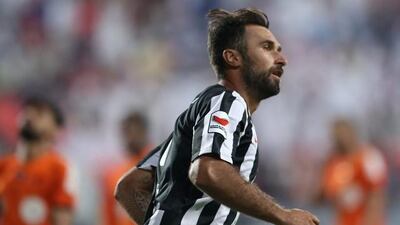The case in favour of expatriates in the Arabian Gulf League is not hard to make.
They bring the AGL a cadre of hardened professionals who raise standards across the board, they generate much of the attention surrounding the league, and they score two-thirds of the goals.
Finding men who can put a ball into a net is the most difficult task in football. It becomes harder by far when the domestic player pool is as small as it is in the UAE – some 7,000 registered players from a citizenry of barely 1 million.
Counterpoint: Big-ticket imports into the AGL is spending money for nothing
Some are concerned that Emirati players are crowded out of the attacking positions by foreigners, but recent history seems to suggest the best find a way.
Ali Mabkhout is one example, and he must have gained valuable experience training at Al Jazira with expat teammates such as Ricardo Oliveira and Mirko Vucinic.
Ahmed Khalil played in 24 of 26 league games with Al Ahli this season, as did Ismail Al Hammadi. Omar Abdulrahman and his brother Mohammed are ever-presents at Al Ain, injuries permitting. Amer Omar took his chance with Al Wahda this season, scoring nine goals. Ismail Matar still plays for Wahda when he is healthy.
A case can be made that AGL teams should reduce their foreign contingent from four to three, the limit a few years ago. However, it should be recalled that a primary reason the fourth was added was to bring AGL clubs into line with other Asian leagues who had four, which seemed to confer an advantage in the Asian Champions League.
Those who draw contrasts between UAE football of a quarter-century ago and today are comparing apples to oranges. Asian football in 1990, when the UAE went to the Fifa World Cup, was dominated by Gulf teams. Japan, South Korea, Australia and China had yet to rise, and Uzbekistan was still part of the Soviet Union. Al Ain’s Champions League final victory of 2003 came against a Thai team that would be overwhelmed by East Asia’s elite clubs today.
The competition on the continent is far stiffer, and the UAE being ranked fifth in Asia is because of the international talent in their home league, not in spite of it.
How much expats are paid is not particularly relevant as long as the presidents and chairmen of AGL clubs are willing to spend the money; we are not seeing clubs go out of business.
In 2013, the UAE was 13th in the world in spending on foreign players. That is good. It means many good players came into the league. And who was at the top of that spending list? England, Italy, France, Spain and Germany, in that order. If it is excellence we want in local football, being in the same discussion with those five is a good place to start.
The league and its expats create the backdrop for the development of local players. It cannot be dismissed as a coincidence that the most successful generation of Emirati footballers has risen at a time when the domestic league has more expats than ever before.
poberjuerge@thenational.ae
Follow us on Twitter @NatSportUAE

